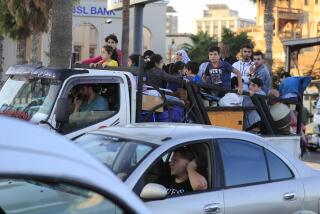Reprisals feared after blast
BAGHDAD — Yousef Badr stood among dozens of fellow laborers who rose early and gathered on a grimy street corner in the Sadr City neighborhood with their battered hand tools and hopes for a day’s pay.
The bomb blast that shattered their morning ritual, killing 31 people and injuring more than 50 on Monday, was the first large-scale attack on the predominantly Shiite Muslim neighborhood in more than a month, and stoked fears that a wave of retaliatory killings would soon follow.
“It was a huge explosion,” said the 30-year-old Badr, who described being thrown to the ground by the blast in the heart of the neighborhood of 2.5 million.
Shrapnel ripped through the crowd and peppered ramshackle kiosks where laborers bought tea and hot soup as they waited to be hired for $8 to $10 a day. Among the dead was a tea seller known to regular customers by her nickname, Um Hattab.
Iraqi officials said the explosives were packed in a car. But witnesses said the bomb appeared to have been hidden in a bag left at the site, where a crater was hard to distinguish from the numerous potholes.
Several residents said the attack was revenge for a neighborhood protest a day earlier against a days-long U.S. military operation that has severely restricted movement in and out of Sadr City. The neighborhood is a stronghold of the Shiite militia led by anti-American cleric Muqtada Sadr.
“They’re trying to quiet us down so that we won’t hold any more demonstrations,” said Ouda Gumar, a 50-year-old plasterer, as residents collected strewn tools and bloody scraps of clothing into separate piles nearby.
Five car bombs exploded elsewhere in the capital Monday, killing at least a dozen other people and injuring more than 30. Fifteen bodies were discovered throughout the city.
The attacks came as the U.S. military reported the deaths of two troops. An unidentified member of the 89th Military Police Brigade died of wounds from small-arms fire Monday in eastern Baghdad, and a Marine died in combat Friday in Al Anbar province. The Marine was identified as Sgt. Luke J. Zimmerman, 24.
The deaths brought military fatalities to at least 101 in October, according to the website icasualties.org, which tracks casualties in the Iraq conflict.
Early today, the military announced two more Monday deaths, taking the monthly toll to 103. Gunfire hit one soldier during combat operations in western Baghdad, and a roadside bomb killed the other south of the capital.
The rising U.S. death toll and persistent sectarian violence have fed widespread misgivings about the Bush administration’s handling of Iraq as Americans prepare to vote in midterm congressional elections next week.
At the same time, U.S. and Iraqi leaders have sought to smooth differences over how to cope with the back-and-forth violence by Sunni Arab insurgents and Shiite militias, including Sadr’s Al Mahdi army, believed responsible for many of the hundreds of killings and kidnappings in recent months.
Iraqi Prime Minister Nouri Maliki, who is Shiite, has urged President Bush to give Iraqi security forces more leeway to deal with armed groups. But some of the main Shiite militias are tied to groups that make up Maliki’s power base, raising questions about his ability and willingness to combat them.
Amid tense exchanges between the two administrations, U.S. national security advisor Stephen Hadley made an unannounced visit to Baghdad on Monday to meet with his Iraqi counterpart and Maliki on military coordination.
The Iraqi government issued a brief statement afterward saying the officials worked on details of a joint commission on security, training and reconciliation that Bush and Maliki agreed to Saturday.
In other developments, Maliki blamed “the dirty hands of terrorism” for the fatal shooting Monday of Issam Rawi, a prominent Sunni politician and leading member of the hard-line Muslim Scholars Assn.
In Sadr City, residents quickly sought to resume their routines. Few seemed to believe it would be the last attack. A bombing in the neighborhood last month killed more than 30 people.
Sadr released a statement criticizing what he called an American embargo on Sadr City and the Karada neighborhood in central Baghdad, where U.S. forces have imposed a series of roadblocks since the apparent kidnapping last week of an Iraqi American soldier.
The soldier was secretly married to an Iraqi woman and was abducted when he visited her in Karada, the New York Times reported Monday, citing people who said they were his in-laws. Those people identified the soldier as Ahmed Qusai al-Taei, 41. The military has not identified the missing soldier.
*
More to Read
Sign up for Essential California
The most important California stories and recommendations in your inbox every morning.
You may occasionally receive promotional content from the Los Angeles Times.










